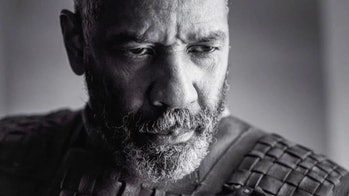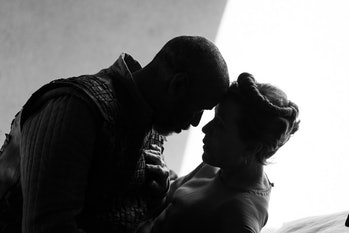Two notes from watching The Tragedy of Macbeth, Joel Coen’s first directing gig without his brother, Ethan. One, Ethan’s the funny Coen. Two, Denzel Washington is one of the world’s greatest living actors. Not that Washington needed to prove himself, but watching him step into the complicated role of Lord Macbeth, Thane of Glamis, with staggering ease is a welcome pleasure. Watching the best be the best never gets old.
This is especially true of post-Game of Thrones pop culture as HBO’s competitors scramble to produce heirs to the prestige fantasy’s legacy: Amazon has The Wheel of Time, Netflix (via BBC Two) has The Last Kingdom, Starz (via BBC One) has The White Queen, and History has Vikings. (Meanwhile, HBO has its own prequel series House of the Dragon set for a 2022 premiere.)
A24 and Apple TV+ haven’t positioned The Tragedy of Macbeth as their joint effort at siphoning off that Thrones juice, but the HBO show drew so much influence from Shakespeare’s plays in general, and from Macbeth specifically, that framing Coen’s film in Thrones terms makes sense.
There is no Game of Thrones, at least not as we recognize it, without Macbeth. Two years after GoT’s conclusion, though, The Tragedy of Macbeth casually shows up Game of Thrones as pomp and soap, a medieval-fantasy melodrama featuring incest, dragons, and ice zombies. (Nothing wrong with dragons or ice zombies, mind you.) The show brims with many-faced villains we’re supposed to empathize with, but none compare to Macbeth, one of their clear forebears, on grounds of complexity.
Partly that’s a matter of performance. Again: Washington is a legend. Achievement has been his career’s standard since breaking out as Dr. Phillip Chandler on St. Elsewhere in 1982. His work as Macbeth is another notch on a belt so cut up by now that it probably needs replacing. In every scene, Washington carries himself with the weight of experience, filtering his own to fill out Macbeth’s.
Both men have seen and done much over their respective years. Washington’s expressions vacillate between determination and hesitancy, confidence and uncertainty, even in Macbeth’s wickedest moments, a’la the slaying of King Duncan (Brendan Gleeson), an action he makes with stoic regret.


Macbeth knows what he’s doing is wrong. He does it anyway. He’s more like Mel Brooks’ Torquemada, Grand Inquisitor of the Spanish Inquisition, than Thrones’ most notorious heels: Cersei (Lena Heady), Ramsay (Iwan Rheon), Joffrey (Jack Gleeson), Ser Gregor Clegane (pick from Conan Stevens, Ian Whyte, or Hafþór Júlíus Björnsson), and Tywin Lannister (Charles Dance), sans comic relief.
These characters each perform a service to Thrones’ plot the way rack and pinion systems steer cars. The cast has legroom to fill out their roles and give them life, but not to fully humanize them. They do not make human mistakes. They make operatic mistakes. When given good, bad, and worse options, they skip all three and choose the nuclear option instead, like blowing up buildings or feeding babies to dogs. Humanity doesn’t thrive in a sensationalist mire.


Washington’s performance benefits from exacting simplicity. Bruno Delbonnel, Coen’s director of photography as well as on past collaborations with Ethan, shoots The Tragedy of Macbeth with a master’s eye, capturing stripped-down sets and locations in silky black and white in striking compositions.
Washington has nothing to hide behind, which means he has the camera’s full attention and a mandate for excellence. He fulfills that mandate. There is much to recommend the film outside of Washington, of course – the supporting cast is stacked – but together with Coen and Delbonnel, Washington reminds audiences who really perfected the sympathetic villain.




















![[Book Review] The Blade Itself (The First Law Trilogy) by Joe Abercrombie](https://bendthekneegot.com/wp-content/uploads/2018/01/1516047103_maxresdefault-218x150.jpg)

















